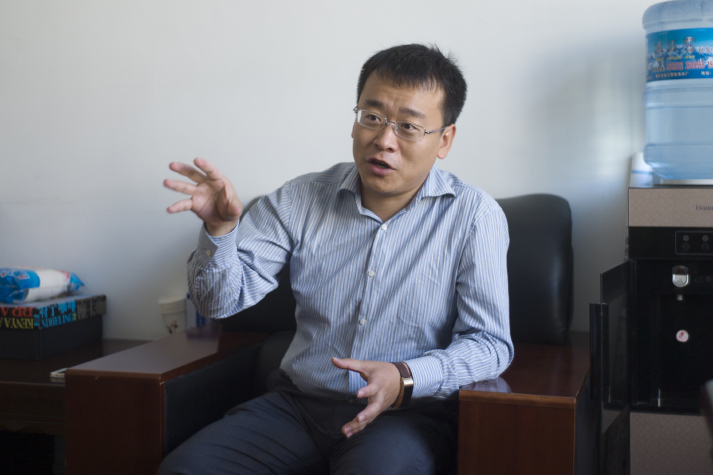| Xinjiang |
| Promise and Devotion | |
| Efforts of a young official to develop a remote county in Xinjiang | |
|
|
 Yao Ning explains his cross-border trading plan on September 23 (CUI NAN)
When Yao Ning's daughter was born last June, she gave Yao one more reason to devote himself as a county leader of northwest China's Xinjiang Uygur Autonomous Region. Yao, 32 years old, took up the position of deputy county chief in Shule County, Kashgar Prefecture, in November 2014. Previously, he worked in the president's office at Tsinghua University after graduating from this top university in China with a doctorate degree. His admirable CV, which includes one year as a visiting scholar at the John F. Kennedy School of Government in the United States, could probably have secured him a sparkling career and comfortable life. Yet, Yao chose to relocate to a poor, remote county in order to make a difference. Although well educated, Yao naturally lacked knowledge of the local situation and culture when he first moved to Shule, and many people doubted his capability in governing a county. But his overseas experience helped him quickly adapt to life in Shule, a majority of whose population are Uygur people. And his rich experience in management at university—he headed the student council and the Communist Youth League committee—enabled him to win local people's trust. "They trust me when they are sure that I fulfill my promises," he said. Diligence brings rewards The development of Shule, located in the southwest of Xinjiang, lags far behind the national average level. The county is populated by 370,000 people, mainly Uygur people, most of whom live on farming. Thanks to continuous attraction of investment, Shule has a certain industrial base, mainly consisting of cotton processing and production of construction components and medical chemicals. Yao saw an opportunity to boost foreign trade among local companies in 2015. Since then, the county's exports have risen from $3 million in 2015 to $290 million at the end of 2016. Since Kashgar borders Tajikistan, Afghanistan and Pakistan, local counties all have the potential to engage in cross-border trade. Shule is one such county, situated some 260 km from Khunjerab Pass, the main land route between China and Pakistan, and 90 km from Torugart Port on the border between China and Kyrgyzstan. Local businesses traditionally engaged in trading of one sort or another, thanks to Shule's geographically advantageous position. However, transportation costs became too high for small private firms operating in the county. "If the deal was urgent, they had to go with a vehicle only half full of commodities," Yao told Beijing Review. This situation inspired Yao to come up with the idea of combining together goods from different firms in group shipments. As many Chinese companies got involved in economic development projects in Pakistan as part of the construction of the China-Pakistan Economic Corridor (CPEC), they became the main target for Yao's cross-border trading plan. "We have researched all the projects in south Pakistan to make sure [we understand] what the clients really need," Yao said. "We can provide small construction components and daily necessities such as instant noodles and washbasins," he added.  A truck drives along the Karakoram Highway on June 28, 2016. Construction of the highway’s second stage began in April 2016 as the core element of the land route of the China-Pakistan Economic Corridor (XINHUA)
Yao's vision is to develop Shule into a core supply base by mitigating the high transportation costs of inter-regional trade. Besides human factors, the severe local environmental conditions—high altitude, complex terrain and frequent natural disasters—also present challenges and cause significant difficulties. A landslide in 2010 severed the Karakorum Highway (KKH)—the main land artery connecting the cities of Kashgar in China and Gilgit in Pakistan—completely disrupting cross-border traffic. Fortunately for those involved in cross-border commerce, a five-year major engineering project to upgrade the KKH, which slashed the journey time through the route's central section—including Khunjerab Pass—from 20 hours to less than 10 hours, was completed in September 2015. "We really caught a lot of good opportunities [that enabled us] to achieve impressive figures in 2016," Yao said proudly. Yao saw the reconnection of the KKH as a reward for his hard work. For the people of Shule, however, it was Yao who led them to seize good opportunities. On the basis of his excellent performance in Shule, Yao was promoted in July to deputy director of the Office of the Communist Party of China Kashgar Prefectural Committee, mainly focusing on economic development and poverty reduction. Addressing needs During Yao's 10 years of Tsinghua campus life—from an undergraduate to an employee with a doctorate—Yao formed a practical working style, which is seen as a hallmark of the university's spirit. His experience at Harvard, meanwhile, made him more confident in China and China's governance system. While people typically expect a person with Yao's elite background and education to develop a career in academia, business or government, Yao had different ideas. When standing for election as president of the Tsinghua student council in 2008, Yao made a promise. "Now that I have inspired everyone to go west and go to the most undeveloped places, I'll lead by example," Yao said at the time. Different from many graduates from top universities who tend to choose a life that is more comfortable in big cities, Yao wants to help people who are still in poverty. Yao's family of four—the couple and his wife's mother, who helps take care of their daughter—live in a 20-year-old, two-bedroom apartment in Kashgar City, a third or fourth-tier city. He used to say to some friends, "High-rise buildings are [being built] everywhere in China. That's one side of China. But, have you ever been to a poor person's home?" Often he would add, "Everyone has his or her own choice of lifestyle. I'll continue my grassroots work." This attitude formed during Yao's childhood, as he witnessed his mother, a gynecologist, helping poor people and saving their lives. Even though he went on to attend a top international school, he never forgot what poverty is like. According to Yao, the core of being a primary-level official is meeting people's needs, not seeking personal gain. Yao's wife, Zhou Lingxiu, also moved to Xinjiang for work following her graduation from Tsinghua. The couple got married in Xinjiang in 2015, though without any wedding ceremony. "I hadn't [even] met my father-in-law until we got married," he said. At that time, Yao was fully engaged in developing his cross-border trading plan. "I felt so sorry for her." As his wife takes care of the family's affairs, Yao can devote all his energy to work, which is to improve Kashgar people's living standards. "I hope my daughter can describe Xinjiang as a desirable place when she grows up," Yao said, expressing both a hope for his daughter and a promise made by himself. (Reporting from Kashgar, Xinjiang Uygur Autonomous Region) Copyedited by Chris Surtees Comments to ffli@bjreview.com |
|
||||||||||||||||||||||||||||
|
